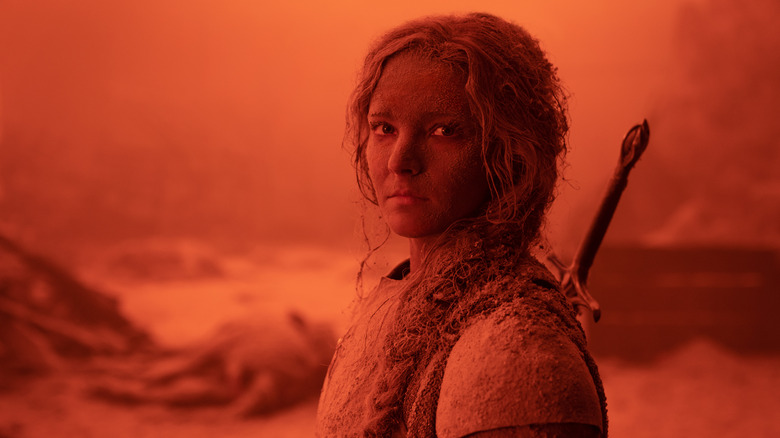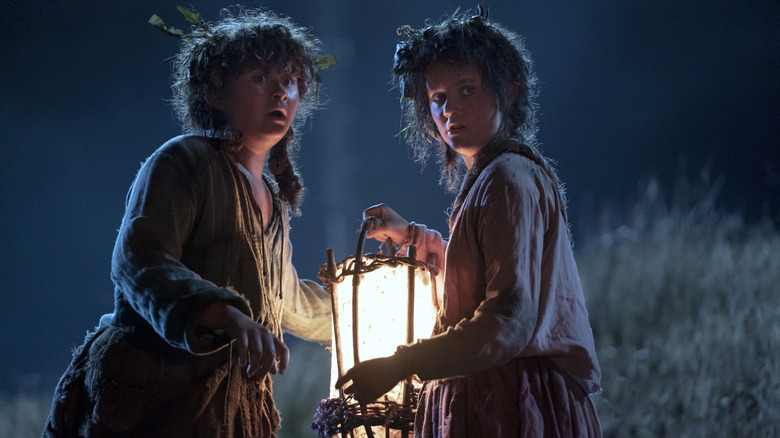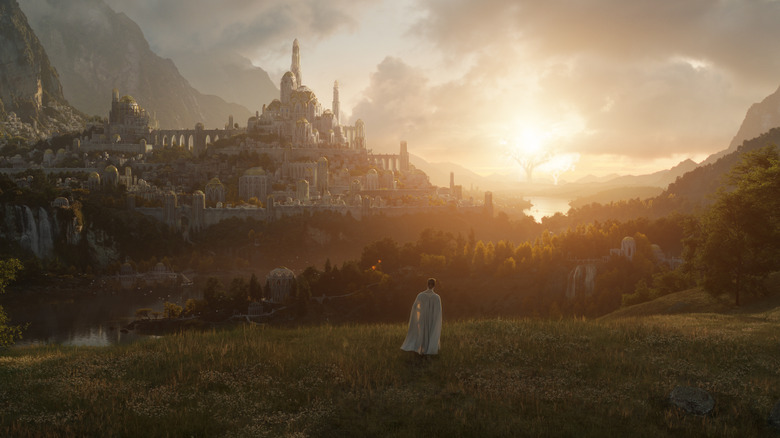The Lord Of The Rings: The Rings Of Power Review: A Sweeping Fantasy Series That Yearns To Recapture The Magic Of Peter Jackson's Trilogy
"The Lord of the Rings: The Rings of Power" arrives on a wave of plenty of coverage about how big the series hopes to be. Amazon sunk $250 million into the TV rights to the world of J. R. R. Tolkien, and they have plans to spend another one billion bucks on a commitment to five seasons, with season 1 reportedly boasting a $465 million price tag. That's a lot of pressure and monetary hype to live up to. And based on the two episodes made available to critics before the show's big premiere, it's clear that Amazon's gamble has (mostly) paid off, at least in terms of scope and scale. The money is up there on the screen, as everything feels suitably epic and huge. While there's an abundance of TV-based framing — we're talking far too many shot/reverse shot conversation moments — the first two episodes, helmed by J. A. Bayona, also pack in plenty of expansive, widescreen shots of Middle-earth, giving us gorgeous landscapes punctuated by fantastical structures.
But try as it might, "The Rings of Power" can't escape the shadow of Peter Jackson's "Lord of the Rings" trilogy. In fact, I'm not even sure the show wants to distance itself (although according to Jackson, Amazon initially asked him to be involved, only to then cut ties), as the series has gone so far as to bring in "Lord of the Rings" composer Howard Shore to compose the show's theme (Bear McCreary handles the rest of the music, and his compositions sound more than a little like Shore's work). And to be fair, if it ain't broke, don't fix it.
I am no Tolkien scholar, or even much of a fan. I've never read any of the "Lord of the Rings" books (I read "The Hobbit" in grade school and found it painfully dull). As such, I have no real attachment to Tolkien's work. And yet, Jackson, working with a massive team of behind-the-scenes folks and a huge ensemble cast, conjured up something that took my breath away. What made Jackson's trilogy so engrossing was that the filmmaker managed to make the world feel lived-in, and more than that, real. It didn't feel like fantasy in the literal sense; it was instead like some form of reality — a living, breathing world full of real characters who just happened to be fantastical. That's not easy to replicate — in fact, Jackson had trouble replicating it himself with his lackluster "Hobbit" trilogy. And despite seemingly all the money in the world, "The Rings of Power" can't quite recapture the magic bottled up in Jackson's three films. I enjoyed what I saw here, but I also kept thinking that what I really wanted to do was rewatch the movies.
Elves, and dwarves, and humans, and hobbits (oh my)
With "The Rings of Power," showrunners J. D. Payne and Patrick McKay aren't turning directly to Tolkien's trilogy. Nor are they doing a straight adaptation of one of his works. Instead, "The Rings of Power" draws inspiration from other parts of the writer's material, especially the various appendices that provide historical context for Tolkien's worlds (think of them as very elaborate footnotes). The show's story is also set in the Second Age of Middle-earth, which is thousands of years before the events of "The Hobbit" and the trilogy. This distance in time allows "The Rings of Power" the freedom to bring in new characters, although a host of familiar names also show up (some individuals live for a long time in Middle-earth). The most notable returning player is the elf Galadriel, played by Cate Blanchett in Jackson's films and here by "Saint Maud" star Morfydd Clark. Clark is appropriately etheral and enchanting in the role, while also free to kick plenty of ass. The Galadriel we meet here is a warrior, a far cry from the cottage core-like woman of the woods we met in the movies.
She's also seemingly the only character in Middle-earth who thinks things aren't right. Her fellow elves, including Elrond (Robert Aramayo), believe that the evil they fought over the years has been vanquished, and now is a time of peace. But of course, that wouldn't make for a very exciting show, so it's not much of a spoiler to tell you that dark forces are gathering on the edges of the story, ready to make life very difficult for the large ensemble cast here.
In addition to Galadriel and her elven pals, we also meet humans (who distrust elves), dwarves (who also distrust elves), and of course, hobbits (they don't appear to have any opinion about elves yet). But these aren't the prim and proper hobbits of "The Lord of the Rings" trilogy; the type that loves to sit around in their homes and read and smoke pipes all day. No, these are Harforts, a breed of hobbit far removed from the Shire. They stick to the woods and live like nomads, hiding when any outsiders come near. This side of the story focuses on the instantly-likable Nori (Markella Kavenagh), a younger, ultra-curious Harfoot who gets swept up in some kind of adventure.
There and back again
With at least five seasons already planned, it's safe to say "The Rings of Power" will bide its time when it comes to storytelling. But the first two episodes, particularly episode 1, move at a remarkably breakneck speed. Best of all, they do so without ever feeling rushed. The first episode alone packs in a ton of backstory in its opening minutes, laying everything out in a clear, scene-setting way that peppers what comes next. I doubt the show will keep this pace up for the remainder of its first season, but it's the perfect way to get things started — dropping us into this world and filling in the blanks.
Still, there's a lot to keep track of here. I found myself consulting "Lord of the Rings" wikis as I watched, just so I could keep track of who is who. The series helpfully shows us a map every time it travels from one location to the next, but it's fair to say a large chunk of "The Rings of Power" is devoted to giving hardcore Tolkien fans plenty to sit up and point at, as if they were that meme of Leonardo DiCaprio in "Once Upon a Time in Hollywood."
That doesn't mean the series is inaccessible. You can easily watch it without knowing all the little details — the series sweeps you up in its sense of adventure from the get-go, and guides you along on a story that may not be entirely successful, but is still plenty evocative. Whether or not "The Lord of the Rings: The Rings of Power" (that clunky title is the worst part of the show) actually lasts multiple seasons has yet to be seen, but based on what I've seen so far, I'm tentatively excited to continue on this journey.
"The Lord of the Rings: The Rings of Power" premieres on Prime Video on September 1, 2022.


